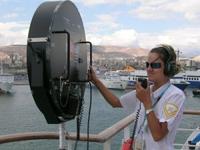-
Carbon Motors faces uncertain future
Carbon Motors, the makers of the specially designed E7 police car, are struggling to survive financially and could be forced to shutter its doors if a $300 million government loan is not approved
-
-
Open-source searches help solve cold cases
Two detectives receive the LexisNexis One Step Closer award for effectively using searches of open or third-party information sources to solve cold cases
-
-
LA sheriff department upgrading its 1980-era terminals
The Los Angeles Sheriff Department is upgrading its 1980s-era terminals, for which it had become difficult for the largest sheriff’s agency in the United States to find parts; the upgrade – Raytheon’s Mobile Digital Computer System (MDCS); the MDCS project and major technology upgrade represents the largest-ever deployment of mobile digital computers to a sheriff’s department in the country
-
-
U.K. industry calls for more ambitious waste management strategy
The U.K. manufacturers’ organization EEF calls for the U.K. government to launch a more ambitious waste management strategy as resource shortages threaten; the EEF says that out of date legislation, limited access to waste facilities, and looming resource crunch requires more radical approach from government
-
-
Protests spur sonic blaster sales boom

With the spate of protests from the Occupy Wall Street movement sweeping across the country, there has been a surge of interest in non-lethal crowd control systems; in particular U.S. police and first responders have taken a keen interest in Long-Range Acoustic Devices (LRAD)
-
-
Government contractors now required to have cybersecurity plans
Based on a new General Services Administration (GSA) rule, all contractors and subcontractors that provide federal agencies with IT services, systems, or supplies are required to submit a cyberescurity plan that matches government regulations
-
-
Web-based interactive solution for first responders
DGI is adding a Web-based, interactive map drawing feature to its CoBRA WEB Mapping; the solution will initially target fire departments, EMS organizations, bomb squads, HAZMAT teams, and police departments as a situational awareness tool to assist in the collaboration of first responders and emergency operation centers
-
-
Texas drought – no end in sight

Residents across Texas are continuing to struggle with one of the state’s worst natural disasters in history; far from a singular event, Texas is experiencing a crippling drought with record low rainfall for the 2011
-
-
Thirty U.S. car dealers caught in Hezbollah terror-financing scheme

Thirty used car dealerships in the United States are currently under investigation for their part in an international money laundering scheme that sent roughly $300 million to the known terrorist organization Hezbollah
-
-
Accenture to bolster capabilities of US-VISIT
DHS has awarded Accenture Federal Services a 13-month, $71 million contract further to enhance the capabilities of US-VISIT
-
-
VeriLook tracks faces in real-time
Neurotechnology recently unveiled its VeriLook Surveillance 2.0, a software system that can track individuals in real-time using facial biometrics
-
-
Raytheon acquires cybersecurity specialist
Large defense contractors are moving into cybersecurity; in its second cybersecurity acquisition in December 2011, and the tenth such acquisition since 2007, Raytheon acquires a Clumbia, Maryland-based company the solutions of which are key components of systems used by the U.S. intelligence community
-
-
TSA awards SpectraFluidics $1.3 million to validate detection technology
TSA has awarded a contract to SpectraFluidics, the detection technology of which leverages two physical principles combined into a single system: free-surface microfluidics and surface-enhanced Raman spectroscopy (SERS)
-
-
U.S., Indian companies to form Indian homeland security joint venture

Defense giant Raytheon is currently in talks with India’s Reliance Industries (RIL) to form a joint venture designed to capitalize on India’s rapidly expanding homeland security market
-
-
ShotSpotter expands to Midwest
Three cities in the Midwest recently announced plans to install gun-shot detecting systems; ShotSpotter, manufactured by SST Inc., has enabled law enforcement agencies in more than sixty cities across the country to know exactly when a shot is fired, where it came from, and how many
-
More headlines
The long view
Factories First: Winning the Drone War Before It Starts
Wars are won by factories before they are won on the battlefield,Martin C. Feldmann writes, noting that the United States lacks the manufacturing depth for the coming drone age. Rectifying this situation “will take far more than procurement tweaks,” Feldmann writes. “It demands a national-level, wartime-scale industrial mobilization.”
Trump Is Fast-Tracking New Coal Mines — Even When They Don’t Make Economic Sense
In Appalachian Tennessee, mines shut down and couldn’t pay their debts. Now a new one is opening under the guise of an “energy emergency.”
Smaller Nuclear Reactors Spark Renewed Interest in a Once-Shunned Energy Source
In the past two years, half the states have taken action to promote nuclear power, from creating nuclear task forces to integrating nuclear into long-term energy plans.
